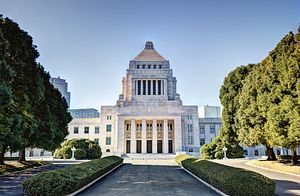On December 10, Japan’s new state secrets law went into effect, a year after Prime Minister Shinzo Abe’s government legislated it into being over strong public opposition. Thousands turned out to protest the bill when it was being negotiated in the Diet, and even now, 80 percent of the Japanese public opposes the law. In the days leading up to its enactment, the Japan Congress of Journalists, Japan Civil Liberties Union, Japan Federation of Commercial Broadcast Workers’ Unions, and several Japanese moviemakers issued statements condemning the law.
The Abe government has pushed forward despite the opposition for a number of reasons. The 2010 leak of video footage showing the clash between Chinese and Japanese ships in the East China Sea may have made the government rethink the importance of protecting information that could be damaging to regional diplomacy. Another important impetus for the new law is the need to share sensitive information with the U.S. and other governments. The U.S. has always been concerned with the laxness surrounding protection of security information in Japan, and heartily welcomed the new law. Ambassador Caroline Kennedy stated last December, “We support the evolution of Japan’s security policies, as they create a new national security strategy, establish a National Security Council, and take steps to protect national security secrets.”
Yet outside the U.S. government’s positive reception, the law is attracting negative international attention. When it was being negotiated in the Diet, Lucy Birmingham, President of the Foreign Correspondents Club of Japan condemned the bill, stating, “The current text of the bill seems to suggest that freedom of the press is no longer a constitutional right, but merely something for which governments must ‘show sufficient consideration.’” Reporters Without Borders and the UN Human Rights Council have also expressed concern. A clamp down on information is a worrying trend in Japan, as Japan dropped 31 places to rank 53rd out of 179 countries from 2012 to 2013, according to the Reporters Without Borders press freedom index.
The law provides for the protection of information in the categories of defense, diplomacy, counter-terrorism and counter-espionage – all important state goals that require a reasonable amount of secrecy. However, its severity, vagueness, and lack of a proper oversight mechanism concern critics who fear that the law will undermine freedom of the press and the Japanese people’s right to know. Abe’s promise that the law is aimed at dealing with “terrorists and spies” and “basically has nothing to do with people at large” may ring hollow in light of revelations about the government’s inept handling of the crisis at the Fukushima Dai-Ichi plant during the March 11 triple disaster. As Reporters Without Borders put it, “How can the government respond to growing demands for transparency from a public outraged by the consequences of the Fukushima nuclear accident if it enacts a law that gives it a free hand to classify any information considered too sensitive as a state secret?” Masako Mori, the state minister in charge of the bill, has explicitly said the law could be applied to the nuclear power industry because nuclear power plants are potential targets for terror attacks, though he also assured people it would not affect the release of information regarding Fukushima Dai-Ichi.
Under the previous law, the length of imprisonment for most Japanese who leaked state secrets was limited to one year, though defense officials could be imprisoned for five to ten years. Now, government officials and defense industry employees who leak state secrets face up to 10 years in prison and a fine of 10 million yen (approximately $100,000). Even journalists and activists who unwittingly solicit information deemed to be state secrets can be prosecuted under this new law, as those who conspire to leak state secrets face up to five years in prison and those who acquire state secrets through illicit means face 10 years.
Even more worryingly, the process of defining state secrets is entirely in the government’s hands. A supervisory committee and panel have been set up to oversee the classification process, yet their independence is questionable as both bodies are composed of government officials. There is no third-party involvement to determine whether the classification is appropriate or not; furthermore, there is no protection for whistle-blowers and no mechanism to punish government officials who classify information as a “state secret” for frivolous or self-serving reasons. Plus, the designation for certain types of state secrets can be extended from 30 to 60 years or even indefinitely based on an internal government decision.
By decreasing transparency in government, the new state secrets law is a fundamental challenge to Japanese democracy. However, the election results of this past Sunday do not bode well for opponents of the law – the largest opposition party, the Democratic Party of Japan, was not able to block the Liberal Democratic Party-Komeito coalition from winning a supermajority despite efforts to remind voters about the state secrets law. Without a strong political ally in the Diet – and with most citizens’ attention focused on the very real economic recession rather than nebulous concepts such as press freedom and the right to know – Japan’s activists will have their work cut out for them to repeal or at least amend the law and increase government accountability.
Mina Pollmann studies at Georgetown University’s School of Foreign Service, majoring in International Politics/Foreign Policy.

































